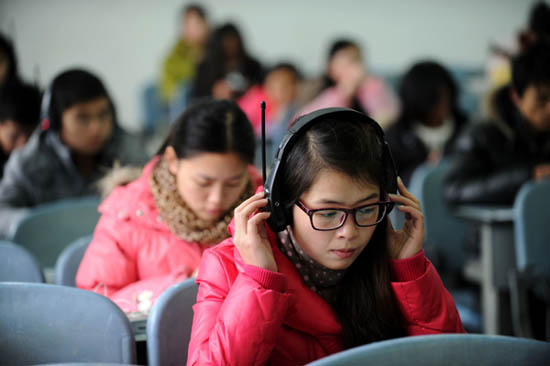
 |
| Students take the national College English Test in a classroom of the Hubei University of Economics in December. [Photo/ XINHUA] |
Current English testing system puts too much pressure on students, advisers say
Chinese political advisers have called for reforms of the English language testing system to make it more effective in cultivating actual language ability.
"Currently, the English testing system in China puts too much pressure on students to get high marks and ignores the development of their comprehensive language capabilities," said Yang Xueyi, a Chinese People's Political Consultative Conference National Committee member and Party chief of Beijing Foreign Studies University.
"Some changes in the evaluation procedures of English examinations are necessary for the sound development of the national English education system," he said.
Yang said the English component in the National College Entrance Examination for senior high school students, or gaokao, should diversify its evaluation criteria to get a more objective assessment of the students' English abilities.
"For English, the students' daily achievements in studying the language should be taken into account, instead of judging their ability with just one test," said Yang, who is also a professor of English language and literature.
He pointed out that one of the biggest challenges in developing English education in China is a traditional lack of emphasis on spoken English.
"Although English education is highly emphasized in the national education system, with the share of English scores in gaokao being as high as 20 percent, spoken English has not been tested as part of the gaokao. Some students do not practice spoken English because it is superfluous in the exam," Yang said, pointing out that spoken English is important for effective communication.
He also suggested the use of different criteria in assessing students from different areas and focused on different majors.
"Because of disparities in the ability of teachers and educational facilities, urban students usually score higher scores than rural students, averaging almost 20 points higher in the gaokao, a decisive margin that could have a decisive impact on their choice of university," Yang said.
"It is unfair and unnecessary for the whole nation to adopt one single admission standard for all students from all the different regions. Students from poor and rural areas should receive favorable treatment, such as getting 20 points more in the final scores than their urban peers, to bridge the gap," said Yang.
He said English requirements for different majors should be varied and colleges should consider passing the College English Test a requirement for graduation.
"For majors closely related to English, such as foreign languages and international affairs, it is understandable the requirement for the students' English proficiency is quite high. Yet it is unnecessary for students majoring in arts or other subjects to spend too much time on English studies because no more than 20 percent of them will need to use it in their lives," said Yang.

















 How real life is, how real love is!
How real life is, how real love is!


![]()
